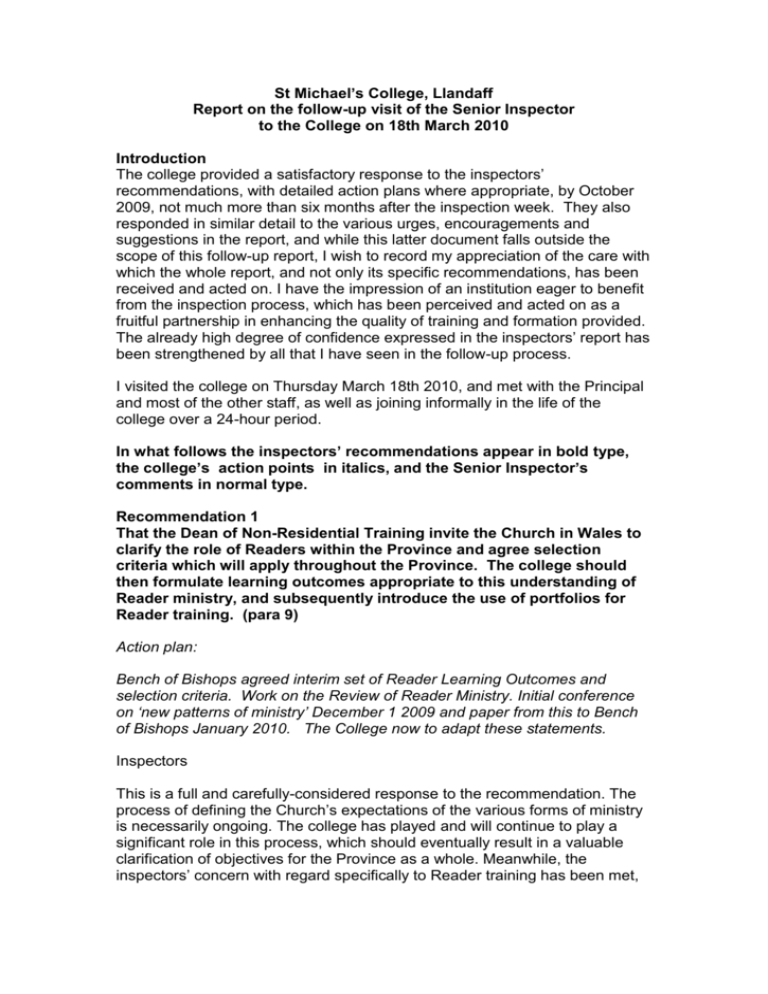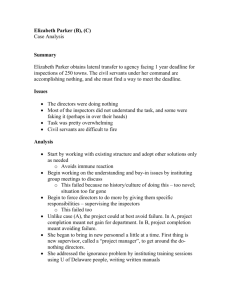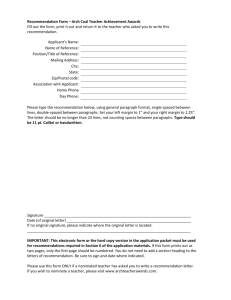St Michael Llandaff - follow-up report
advertisement

St Michael’s College, Llandaff Report on the follow-up visit of the Senior Inspector to the College on 18th March 2010 Introduction The college provided a satisfactory response to the inspectors’ recommendations, with detailed action plans where appropriate, by October 2009, not much more than six months after the inspection week. They also responded in similar detail to the various urges, encouragements and suggestions in the report, and while this latter document falls outside the scope of this follow-up report, I wish to record my appreciation of the care with which the whole report, and not only its specific recommendations, has been received and acted on. I have the impression of an institution eager to benefit from the inspection process, which has been perceived and acted on as a fruitful partnership in enhancing the quality of training and formation provided. The already high degree of confidence expressed in the inspectors’ report has been strengthened by all that I have seen in the follow-up process. I visited the college on Thursday March 18th 2010, and met with the Principal and most of the other staff, as well as joining informally in the life of the college over a 24-hour period. In what follows the inspectors’ recommendations appear in bold type, the college’s action points in italics, and the Senior Inspector’s comments in normal type. Recommendation 1 That the Dean of Non-Residential Training invite the Church in Wales to clarify the role of Readers within the Province and agree selection criteria which will apply throughout the Province. The college should then formulate learning outcomes appropriate to this understanding of Reader ministry, and subsequently introduce the use of portfolios for Reader training. (para 9) Action plan: Bench of Bishops agreed interim set of Reader Learning Outcomes and selection criteria. Work on the Review of Reader Ministry. Initial conference on ‘new patterns of ministry’ December 1 2009 and paper from this to Bench of Bishops January 2010. The College now to adapt these statements. Inspectors This is a full and carefully-considered response to the recommendation. The process of defining the Church’s expectations of the various forms of ministry is necessarily ongoing. The college has played and will continue to play a significant role in this process, which should eventually result in a valuable clarification of objectives for the Province as a whole. Meanwhile, the inspectors’ concern with regard specifically to Reader training has been met, with appropriate learning outcomes defined and the portfolio system now in operation. Recommendation 2 That St Michael’s College and the South Wales Baptist College explore ways of promoting contact between them in areas additional to the university-based teaching programme, for instance by planning joint worship, social events, or discussion of matters of common interest. (para 38) Action plan: A joint worship and social event before Christmas as the basis for developing more regular structured engagement of a liturgical and / or social nature. The possibility of joint training events will be kept under review now that the pastoral studies days are no longer running. Inspectors The joint social event mentioned was duly held. In addition, the college invited members of the Baptist College to join them for a special St David’s Day eucharist. A further social meeting at the Baptist College is planned. The inspectors recognised the practical difficulties in arranging such events, given the differing locations and timetables of the two colleges, and what has been achieved so far, though modest, has been appreciated. The will is there, even though practical solutions are not easy to find. Meanwhile, students of the two colleges continue to be closely involved together in the teaching programme. The Principal of St Michael’s has been invited to join the interviewing panel for the appointment of the next Principal of the Baptist College. Recommendation 3 That the college promote a fuller participation of students in the governance and management of the college, in particular by including a regular report from the student representative on the agenda of Trustees’ meetings. (para 45) Action plan: Recommendation put to and accepted by the Trustees, and the first report by the senior student will be given on September 23, the next Trustee meeting. Inspectors The specific change of including a regular student report on the Trustees’ agenda has been appreciated and will continue. Students have also been involved in planning the refurbishment of college buildings. One result of their involvement has been the provision of a new student common room. Recommendation 4 That the works already identified as essential to meet statutory requirements for safety and disability access be carried out without delay. (para 55) Action plan: The works needed for compliance with safety and disability to be carried out by 1 November 2009. Inspectors I stayed in one of the newly adapted bedrooms, and am duly impressed! The recommendation has been fully met. A much larger programme of refurbishment, including the upgrading of the whole residential block, is scheduled for this summer, and the financing of this has been agreed with the Representative Body of the Church in Wales. Recommendation 5 That early in the next academic year, after allowing for an initial settlingin period, the college engage external consultants to facilitate an opportunity for the whole residential community to work on issues of living together in diversity, and that the need for such a session in future years be kept under review. (para 64) Action plan: The Mennonite organisation Bridge Builders invited in to do a session with us in the first half of the first term. This learning to be incorporated into new core skills module on the subject of ‘engaging diversity’. All-day session using the ‘Friendly Styles Profile’ to included in induction programme to explore what it means for a community of very different people to live and work together. Inspectors The recommended session, facilitated by Bridge Builders, has taken place and has been welcomed. The college has, however, recognised that the issue of living with diversity featured more broadly in the inspectors’ report than just this one recommendation, and this has been taken up more extensively in curriculum planning as well as in the highlighting of this issue for consideration especially in tutorial groups. Indeed the attention given to this issue has become the most significant element in the college’s response to the inspection. There seems to be a general acceptance that this was an issue needing to be addressed, and I am pleased that the inspection has proved to be the catalyst for this. I have examined the outline of the new Core Skills module which contains seven weekly sessions devoted to aspects of ‘Diversity’. It is thorough and challenging. Most members of the college have welcomed this new focus, though some have found it uncomfortable. For this year only the course has been taken by all years together; from next year it will be taken by first years alone. Links with Bridge Builders remain strong, and their input and/or material will continue to be used. I am told that the specific issue of differing attitudes to the ordination of women, which was the basis of the inspectors’ concern, is not now so prominent in college life, but that the principle of living with diversity has proved to be fruitfully applied much more widely. Altogether a satisfactorily wide-ranging response to what was a relatively limited recommendation. Recommendation 6 That the college review the aims and effectiveness of tutorial group meetings, with particular attention to (i) providing a more structured environment for interaction and constructive reflection and feedback in a ‘safe’ environment; (ii) promoting creative but critical analysis of the principles of worship, especially in a group context. (para 82) Action plan: To review the aims of tutorial groups to clarify their role in pastoral support, processing of experiences in placement and college life, building trust among members of the college, and learning to reflect together. Reduce size of groups, which will now all be 6 – 8 people including tutor(s). Reduce the time given to worship to give more time for reflection. Take away the joint group worship occasions in Chapel twice a term. Using the extra time to explore more structured models of reflection, such as that employed within Action Learning Sets. Enabling ordinands to bring topics for reflection to the groups including the principles of worship. New arrangements for tutorial groups began on September 23. Inspectors This is another significant change in response to our recommendation. It is clearly set out in a new document outlining the rationale and functioning of the tutorial groups. The new composition and agenda of the groups was widely welcomed by those I spoke to. While each group is free to decide its own agenda and method of working, with the primary initiative coming from the student members, there is a shared understanding of the purpose of the groups which ensures that the time is productively used. Recommendation 7 That the college strengthen the role of pastoral care of students through: (i) ensuring that personal tutors are able to be regularly available in college and present at college worship whenever possible; (ii) ensuring that all students have regular meetings with tutors according to the college’s guidelines; (iii) ensuring that chaplains are regularly present in college, and are available to provide confidential support as needed; (iv) actively encouraging students to find spiritual directors who take no other part in any area of their training. (para 84) Action plan: i) to ensure that personal tutors, within the constraints of some of them being offsite and part-time, continue to be regularly available in college and in most cases easily contactable by e-mail when off-site, and are present at college worship whenever possible. ii) to strengthen and clarify the guidelines for tutorial practice (when meetings should be taking place, topics to be covered including spiritual direction, provision of a record of meetings) iii) to strengthen chaplaincy provision. New tutorial arrangements begun on September 23 2009. Inspectors All the actions listed are appropriate, and together they go a long way to meeting the inspectors’ concerns. Our concern expressed in point (i) above remains, and is fully recognised by the college. It is an apparently inevitable result of the fact that several tutors, by the nature of their job description, have significant commitments outside the regular college routine, while others are honorary tutors not on the teaching staff. Within those constraints I am satisfied that the college is doing all it can to provide suitable tutorial support, and that tutors are conscientious beyond the call of duty in fulfilling their tutorial responsibilities. The ‘Personal Tutor Checklist’ is full and detailed, covering the agenda for three individual tutorial meetings a term (the second one devoted specifically to monitoring and guiding the compilation of the student’s portfolio). It includes explicit and repeated enquiry into students’ use of spiritual direction. Recommendation 8 That the college give further attention to enabling both ordinands and trainee Readers to understand the theology, theory and practice of ministry teams and collaborative ministry. (para 87) Action plan: To review Believing and Belonging Module ( Level 1 module of the BTh ) which will be taken by nearly all students, for whatever ministry they are training to address this issue Begun in October 2009 and to be completed in time for new academic year September 2010. Inspectors The revision of the Believing and Belonging module is intended to be quite extensive. It will not be complete until later this year, in time for the new academic year. The member of staff responsible for its revision will take account of the inspectors’ concern. Team and collaborative ministry will also be issues highlighted in the planning of student placements. Recommendation 9 That the college seek a clear understanding of what the relevant church authorities require in the annual reports on students, and that such reports be detailed and objective. (para 89) Action plan: To review the quality of reports with the bench of bishops in the Church in Wales in June 2009, and put in place a process of improvement. Inspectors The recommendation has been met. It has been agreed that in future all reports on non-resident students will be written by the Dean of Non-residential Training, based on material submitted by the students’ personal tutors. It is envisaged that this will result in a greater consistency in the style and content of reports, and in particular will ensure that they cover the areas expected by the relevant church authorities. Recommendation 10 That the college regularly review the relationship between the requirements of the academic curriculum and of the courses relating to pastoral formation, to ensure an appropriate balance, with adequate time for prayer and reflection and, importantly, for the students’ family and personal life, thus modelling an appropriate work/life balance for their future ministry. (para 90) Action plan: To include work/life balance as a topic on the tutor checklist so that it is kept under review with personal tutors. to include a session on time management in the training context early on in the core skills programme to help students develop good patterns early on (November 2009). to review the pathway for some students who may struggle with the academic requirements of a degree, with the possibility of studying for a diploma over 3 years. Inspectors The checklist for interviews with personal tutors now contains explicit attention to the issue of work/life balance at both the beginning and end of each of the first two terms of each year. A thoroughly practical session on timemanagement was incorporated into the first-year core skills programme and was appreciated. One student who was finding it too difficult to combine the demands of the academic course with appropriate personal and home life has been transferred, with the approval of the sponsoring diocese, to a three-year diploma course. Recommendation 11 That the college seek ways of incorporating appropriate insights developed in the Centre for Chaplaincy Studies into the general ministerial training, particularly as it relates to exploring the interface between theology and public life. (para 100) Action plan: To review the integration of insights from Chaplaincy Studies within the general ministerial training at a residential curriculum review meeting (July 2009). To draw on chaplaincy insights in the planning of schools placements for all students Dean of Chaplaincy Studies to lead sessions in diversity core skills module autumn term 2009 incorporating insights of chaplains into this issue. In the longer term, the aim is to consider how insights from chaplains shape and inform understandings of mission and public theology considered within general ministerial training. Inspectors This is necessarily a long-term process rather than being susceptible to a quick-fix solution, but the possibilities listed seem appropriate. The involvement of the Dean of Chaplaincy Studies in the Core Skills module is a significant step in this direction, enabling issues of cultural and ideological difference encountered in chaplaincy situations to feed into the college’s thinking about living with diversity. Recommendation 12 That both colleges work with the School of Religious and Theological Studies to ensure that students receive adequate feedback on their assessed work both formative and summative. (para 106) Action plan Paper written by Dean of Residential Studies. To be considered again by the School of Religious and Theological Studies (November 2009) to draw up new feedback sheet for more formalised feedback as a result of these discussions Inspectors It is good that the issue has been raised with the School of Religious and Theological Studies (or, as it is now becoming, the School of History, Archaeology and Religion). I understand that discussion is continuing, but it is not realistic to expect any formal change at a time when the School itself is in a state of transition. In the meantime I am assured that appropriate ways have been found to provide students informally with the feedback they need. Recommendation 13 That in order to provide suitable female role-models for ordained ministry the college (i) review the process for recruiting new staff, to ensure that suitable female candidates of high calibre are made aware of vacancies; (ii) ensure that, in the absence of such an appointment to the full-time staff, an appropriate gender balance is provided in other aspects of the college’s life, particularly in relation to invited preachers, the membership of the Trustees, the identification of placement supervisors, and the inclusion of female scholars in bibliographies. (para 131) Action plan Preachers are already invited according to gender criteria. Ditto placement supervisors. A lay woman has been appointed as Dean of Non Residential Training. The future structure of the Trustee Board is under discussion, following the investment by the Church in Wales in refurbishing the college estate in the summer of 2010. This means that action on the gender representation of the Trustee body must await developments. Inspectors The lengthy response on this point which the inspectors received with reference both to the college’s programme and to the composition of the Trustee body makes it clear that the inspectors’ concern has been heard and is shared by the college. We recognise that until a vacancy occurs in the teaching staff there is no possibility of appointing a female staff member, and that the college is well aware of the need to do so when an opportunity does occur, and will put in place appropriate measures to ensure that suitable female applicants are made aware of the vacancy. We recognise too that the constraints of the constitution limit the scope for introducing more female members to the Trustee body though we would continue to ask for the college to address this issue as the opportunity arises. It is good to know, however, that a female archdeacon has been coopted onto the Trustees’ Finance Committee. Recommendation 14 That the following text be added to the information about Disciplinary Policy and Procedure in the Formation for Ministry Handbook: ‘Methodist student ministers are under the oversight of the Wales Training Network Oversight Committee. The Principal will take the steps described on p.43 in conjunction with the Methodist Oversight Tutor and the Oversight Committee. The ultimate decision in disciplinary matters rests with the Oversight Committee. A paper giving full information on the procedures of Oversight Committees is available from the Connexional Team and on the Methodist Church website.’ (para 141) Action plan This has been accepted by the Trustees and the relevant handbooks have been changed. Inspectors This was a formal change to documentation, which requires no further comment. Conclusion The college’s response to the inspectors’ recommendations (and, as mentioned above, to the many less formal suggestions contained in the report) has been energetic and enthusiastic. It is remarkable how much of what was recommended is already in place. Where matters remain to be concluded it is for clear logistical reasons or because of considerations outside the college’s control. I would like to pay tribute to a Principal and staff team who are keen to provide the best training available, and who have warmly welcomed the inspection as a positive contribution to that aim. I have no hesitation in commending the college’s response to the inspection report as not merely satisfactory but in many respects exemplary.




